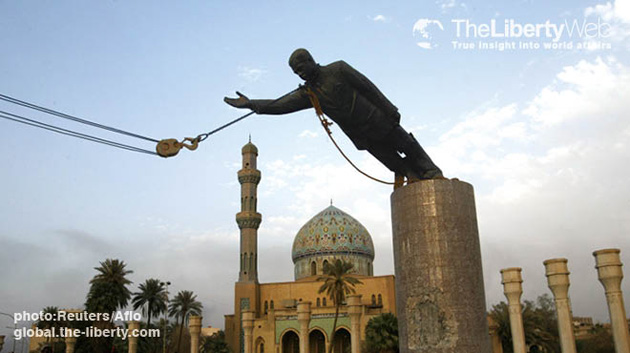The U.S. Should Overcome Its Sense of Guilt Over the Iraq War:
America, Do Not Stop Policing the World
Ten years have passed since the Iraq War. Many pundits found it difficult to justify the war. For that reason, they have judged the war as a futile endeavor. They have also suggested that the failed offensive was an indication of the decline of American power.
For example, an editorial in The Financial Times noted that the Bush administration was wrong to link Saddam Hussein with Osama bin Laden. It also stated “exaggerating Saddam’s WMD potential was a terrible mistake.” Then, it concluded the war was not justified, and “the invasion was arguably the biggest diplomatic error of the post-second world war period.”
As suggested by the title of the Nobel laureate Joseph Stiglitz’s book, The Three Trillion Dollar War, defense expenditures have skyrocketed; the total amount of costs from the Iraq War may have already exceeded three trillion dollars as of 2008. Stiglitz’s writing claimed that if the U.S. had saved a portion of the total invasion cost, it could have secured a base for social security that would have lasted for the next three hundred years.
If you were to include the victims of Afghanistan, the war has claimed the lives of more than 4400 U.S. soldiers, which of course surpasses the number of victims from 9/11.
As a result of these occurrences, the Obama administration has become hesitant to conduct boots on the ground interventions as seen in Iraq and Afghanistan.
The U.S. response to the slaughter in Syria has provided the world’s media with another significant American act to interpret. According to reports, the Assad regime has cost the lives of some 90,000 people already, and one million have thus far fled into neighboring countries. Despite the situation, the U.S. Secretary of State Jon Kerry made an announcement at the end of February that he would provide opposition groups with non-military aid, which included food and medical supplies and amounted to 60 million U.S. dollars.
Information has indicated that the U.S. intended to avoid being drawn into a potential intervention in Syria, consequently the Secretary of State decided to furnish the opposition group with non-military aid. However, critics have been right to assert that the later Americans postpone their intervention, the more al Qaeda could infiltrate the opposition group.
A high possibility exists that the U.S. may take the same stance on military intervention in Asia. Therefore, Japan should prepare for the worst, which could mean possible military on the Korean Peninsula. Master Ryuho Okawa, the CEO and founder of Happy Science, envisioned the Korean Peninsula’s future with the help of Edgar Cayce’s spirit in February. Master Okawa revealed an absence of certainty in the arrival of the U.S. military in the event of a foreseeable conflict in the time to come. (Part 1: The Second Korean War Could Break Out Between the Spring and the Fall)
President Obama ran his reelection campaign while he insisted that the Bush administration’s military intervention was wrong. Obama crusaded for troops pullouts from Iraq and Afghanistan, and he achieved them. That being the case, President Obama may continue to support non-interventionist policies. In order to make provisions for Japan’s future defense strategy in Asia, it is now time for a correct assessment of the Iraq War.
In the book titled Was Bush’s Iraq War a Battle For Justice? (the English version of this book will be available in June), Master Ryuho Okawa made known the surprising fact that there was a link between Saddam Hussein and Osama bin Laden. It would appear that Hussein was the mastermind of the 9/11 attacks. Master Okawa also brought to light how Iraq was already in possession of WMDs, which Iraqis may have thrown away before U.N. inspectors arrived on the scene.
Now the U.S. appears to be relying on U.N. sanctions to straighten out its international affairs. However, solving issues primarily through the United Nations contradicts the notion of the World’s Policeman. The World’s Policeman means ‘unilateralism’, i.e., to act alone and to take the lead without the backing of the U.N. Security Council’s resolution.
American citizens should recognize that the Iraq war was indeed justified and restore their country’s influence on the world stage. This would help the U.S. to make an effective response if and when another emergency were to take place in East Asia.
Related
- Was Bush's Iraq War a Battle for Justice’s Sake?
Was Saddam Hussein involved in 9/11? President Obama declared that the former U.S. President Bush made a "big mistake" by starting the Iraq War and executing Saddam Hussein. President Obama also took credit for bringing down Bin Laden, his enemy mastermind. However, was that really the truth? Master Ryuho Okawa, a world teacher and the Happy Science Group’s founder, tackled the above question, which has raised doubts and suspicion worldwide...
- The Truth Behind the Algerian Hostage Crisis (Part 1)
"It is a jihad (holy war)….The pagans, who are pretending to make Algeria wealthy and are trying to take over the country, must be killed. I declare that the pagans should not come,” said the spirit of Bin Laden on the Algerian hostage terror crisis...
- The Truth Behind the Algerian Hostage Crisis (Part 2)
Bin Laden also revealed that the Islamic extremists interact closely with the Chinese, saying that China offered to cooperate and help by providing a lot of weapons to Islamic forces. He added that if their partnership are successful, then they may be able to defeat the West...



















